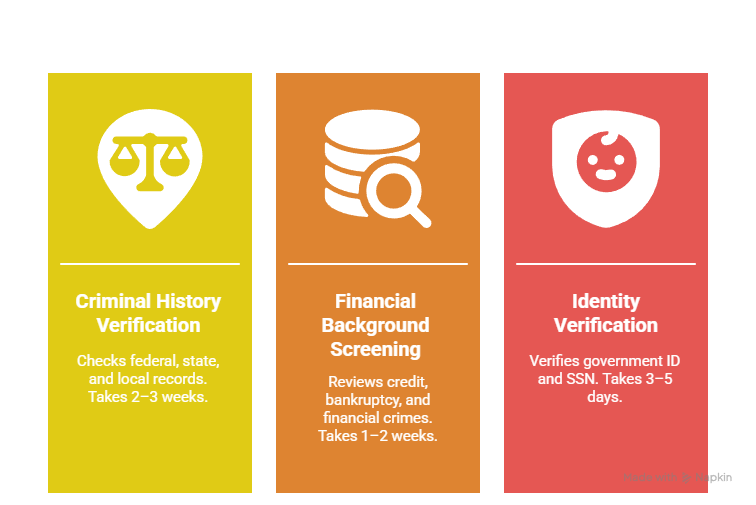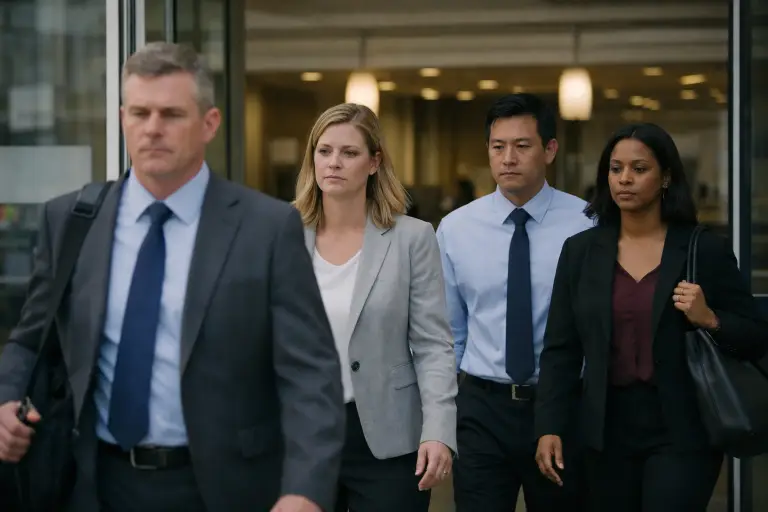California cannabis industry background checks are comprehensive screening processes mandated by the Department of Cannabis Control (DCC) that evaluate criminal history, financial records, regulatory compliance, and identity verification for all cannabis workers and business owners. These stringent requirements ensure industry integrity while creating pathways for qualified individuals to enter California's rapidly growing cannabis sector.
Key Takeaways
- Criminal history verification examines federal, state, and local records, with violent crimes and drug trafficking serving as primary disqualifying factors
- Financial background screening reviews credit history, bankruptcies, and financial impropriety to assess fiscal responsibility within cannabis operations
- Regulatory compliance history evaluates past adherence to laws and regulations, with previous violations requiring closer scrutiny during the application process
- Identity verification procedures use government-issued IDs and Social Security verification to prevent fraud and ensure applicant authenticity
- Appeal and remediation processes provide structured pathways for contesting disqualifications, with timelines ranging from 30 to 120 days for resolution
- Recent 2024 regulatory updates have expanded key employee definitions and streamlined appeals while enhancing social equity provisions
Understanding California Cannabis Background Check Requirements
The California cannabis industry operates under some of the most comprehensive background check requirements in the United States. These regulations serve as the foundation for maintaining industry integrity and public safety. The Department of Cannabis Control (DCC) has established these requirements to ensure that only qualified, responsible individuals participate in the state's legal cannabis market.
Cannabis background checks in California encompass multiple verification layers designed to protect consumers, businesses, and the industry's reputation. The process evaluates an individual's complete professional and personal history to determine their suitability for cannabis industry employment. Understanding these requirements is crucial for anyone seeking to enter this rapidly growing sector.
The regulatory framework addresses key areas of concern including criminal activity, financial responsibility, and regulatory compliance. Each component plays a vital role in the overall assessment process, contributing to comprehensive risk evaluation for potential cannabis industry participants.
Department of Cannabis Control (DCC) Overview
The Department of Cannabis Control serves as California's primary regulatory authority for all cannabis-related activities. Established to consolidate oversight responsibilities, the DCC ensures consistent application of background check standards across all cannabis license types. This centralized approach streamlines the regulatory process while maintaining rigorous safety and compliance standards.

The DCC's background check framework operates through several interconnected components. Criminal history verification forms the cornerstone of the screening process, examining federal, state, and local criminal records to identify potential red flags. Financial background screening evaluates an applicant's fiscal responsibility through credit checks, bankruptcy records, and financial impropriety investigations. Regulatory compliance history reviews past adherence to cannabis and related industry regulations.
Identity verification procedures ensure applicant authenticity through government-issued identification and Social Security verification processes. Disqualifying offense evaluation provides case-by-case assessment of criminal convictions, considering factors such as offense severity, time elapsed since conviction, and evidence of rehabilitation.
| Background Check Component | Primary Focus | Review Timeline |
| Criminal History Verification | Federal, State, Local Records | 2-3 weeks |
| Financial Background Screening | Credit, Bankruptcy, Financial Crimes | 1-2 weeks |
| Identity Verification | Government ID, SSN Verification | 3-5 days |
This comprehensive approach ensures thorough vetting while providing fair evaluation opportunities for all applicants seeking cannabis industry employment.
MCRSA Compliance Framework
The Medicinal and Adult-Use Cannabis Regulation and Safety Act (MCRSA) establishes the legal foundation for California's background check requirements. This framework defines specific screening obligations based on an individual's role and level of responsibility within cannabis operations. MCRSA compliance ensures consistent application of background check standards across all cannabis business types.
Under MCRSA guidelines, different positions require varying levels of scrutiny. Business owners with 100% ownership undergo the most comprehensive screening, including complete financial disclosure and extensive criminal history review. Financial interest holders with 20% or greater stakes face similar requirements to ensure their backgrounds don't pose risks to business operations or industry integrity.
Board members and officers receive thorough screening due to their decision-making authority and fiduciary responsibilities. Key employees and managers with operational control undergo detailed background checks appropriate to their level of access and responsibility. Contractors and service providers may require screening based on their facility access levels and interaction with cannabis operations.
The MCRSA framework also addresses annual renewal requirements for most positions, ensuring ongoing compliance throughout an individual's cannabis industry career. This approach maintains current information while adapting to changing circumstances in both the industry and individual backgrounds.
California Cannabis Background Check Process

Step 1: Application Submission
The background check process begins with comprehensive application submission through the DCC's online portal. Applicants must provide complete documentation including government-issued identification, Social Security verification, and detailed employment history covering the previous ten years. Financial disclosure statements and criminal history questionnaires complete the initial submission requirements.
Accuracy and completeness in application submission significantly impact processing timelines and approval odds. Missing documents or incomplete information frequently cause delays and may raise questions about an applicant's attention to detail. The DCC reviews applications holistically, considering all provided information in their assessment process.
Step 2: Criminal History Screening
Criminal history screening represents the most comprehensive component of California cannabis background checks. The process involves multiple investigative layers designed to identify potential risks and ensure industry safety standards.
Federal-level searches utilize FBI databases and national criminal records to identify interstate violations and federal crimes. These searches provide the broadest scope of criminal history information. State-level investigations through the California Department of Justice examine state court records and California-specific violations. Local jurisdiction screening reviews city and county records for violations that may not appear in state or federal databases.
Each screening level contributes unique information to the overall criminal history assessment. The multi-layered approach ensures comprehensive coverage while identifying potential issues that single-source searches might miss.
Step 3: Disqualifying Factors Assessment
The DCC evaluates potential disqualifying factors on a case-by-case basis, considering the nature of offenses, time elapsed since conviction, and evidence of rehabilitation. Felony convictions involving violent crimes, drug trafficking, or financial fraud typically pose the greatest challenges to approval. However, the DCC considers individual circumstances and rehabilitation efforts in their assessments.
Misdemeanor considerations receive individual evaluation based on their relevance to cannabis industry responsibilities. Offenses directly related to safety, compliance, or financial responsibility may carry more weight than unrelated minor violations. Transparency in disclosure and evidence of positive behavioral changes can influence these assessments.
The assessment process also considers patterns of behavior rather than isolated incidents. Multiple minor violations may indicate ongoing compliance issues, while single incidents followed by clean records may suggest successful rehabilitation.
Step 4: Appeal and Remediation Process
California provides structured appeal processes for applicants who receive unfavorable background check decisions. The system ensures fair evaluation while maintaining industry safety standards.
The appeal timeline follows specific stages: Initial Review (30 days) allows applicants to request reconsideration with additional documentation. Appeal Submission (60 days) provides formal appeal opportunities with detailed written submissions. Hearing Process (90 days) offers administrative hearings for contested decisions. Final Decision (120 days) concludes the appeal process with binding determinations.
Successful appeals often include new evidence of rehabilitation, corrections to factual errors, or demonstrations that circumstances have changed since the original assessment. Legal representation can be valuable during appeal processes, particularly for complex cases involving multiple issues.
Background Check Requirements by License Type
Cannabis Retailer Background Checks
Cannabis retail operations require comprehensive background screening for all key positions due to direct consumer interaction and product handling responsibilities. The screening requirements vary based on position responsibilities and access levels.
Store managers undergo annual comprehensive DCC screening including criminal history, financial background, and regulatory compliance review. Their leadership roles require demonstrated integrity and compliance capabilities. Budtenders receive standard background checks focused on customer interaction safety and product knowledge requirements. These positions require annual renewals to maintain current screening status.
Security personnel face enhanced screening due to facility protection responsibilities and access to valuable inventory. Their background checks include specialized security-related evaluations and require annual updates. Delivery drivers must pass both DCC cannabis screening and Department of Transportation requirements, ensuring compliance with both cannabis regulations and transportation safety standards.
| Position | Screening Level | Renewal Frequency | Special Requirements |
| Store Manager | Comprehensive | Annual | Leadership Assessment |
| Budtender | Standard | Annual | Customer Interaction Focus |
| Security Personnel | Enhanced | Annual | Security Background Review |
| Delivery Driver | Dual (DCC + DOT) | Annual | Transportation Safety |
The retail environment's public-facing nature requires consistent application of background check standards to maintain consumer confidence and regulatory compliance.
Manufacturing Facility Requirements
Cannabis manufacturing operations face unique safety and quality control challenges that require specialized background screening approaches. Manufacturing roles involve handling concentrated products, operating complex equipment, and ensuring product safety standards.
Quality control screening for manufacturing personnel emphasizes technical competence and attention to detail. These positions require demonstrated ability to maintain product standards and regulatory compliance. Laboratory technician verification involves comprehensive review of technical qualifications, educational background, and previous laboratory experience.
Security and hazardous material handling evaluations address the unique risks associated with manufacturing operations. Personnel handling potentially dangerous equipment or materials undergo enhanced screening focused on safety compliance and risk management capabilities.
Manufacturing facilities also require regular renewal of background checks to ensure ongoing compliance as operations evolve and personnel responsibilities change over time.
Cultivation Operation Screening
Cannabis cultivation operations require specialized background screening focused on agricultural expertise, environmental compliance, and worker safety. Cultivation environments present unique challenges requiring specific qualifications and safety awareness.
Agricultural and environmental compliance screening evaluates experience with agricultural regulations, pesticide handling, and environmental protection standards. Personnel must demonstrate understanding of sustainable cultivation practices and regulatory requirements. Pesticide application and worker safety certifications ensure proper handling of agricultural chemicals and protection of worker health.
Cultivation screening also addresses water usage compliance, waste management practices, and conservation efforts required under California environmental regulations. Personnel involved in cultivation operations must demonstrate commitment to sustainable practices and environmental responsibility.
Employment Screening Best Practices
For Job Seekers
Successful navigation of California cannabis background checks requires thorough preparation and strategic approach. Job seekers should begin by gathering all required documentation well in advance of application submission. This includes government-issued identification, Social Security documentation, and comprehensive employment and residence history for the previous decade.
Transparency serves as the foundation for successful applications. Applicants should address any potential issues proactively rather than hoping they won't be discovered. Consulting with legal professionals before application submission can provide valuable guidance for addressing complex situations or past issues.
Experience alignment with cannabis industry needs can strengthen applications significantly. Even candidates without direct cannabis experience can highlight transferable skills from related industries such as agriculture, retail, or healthcare. Demonstrating genuine interest in cannabis industry participation through education, training, or volunteer activities can also enhance application strength.
For HR Professionals and Staffing Agencies
HR professionals in the cannabis industry must develop comprehensive screening protocols that ensure DCC compliance while maintaining fair and consistent hiring practices. Standard protocols should include detailed documentation requirements, clear evaluation criteria, and consistent application across all candidates and positions.
Legal compliance requires ongoing attention to changing regulations and evolving industry standards. Regular consultation with cannabis industry legal experts helps maintain current knowledge and avoid compliance pitfalls. Technology integration can streamline screening processes while maintaining accuracy and compliance with data security requirements.
Communication with candidates throughout the screening process builds trust and demonstrates professional handling of sensitive information. Clear timelines, regular updates, and transparent processes help candidates understand expectations while positioning the organization as a professional employer of choice.
Common Background Check Challenges
Processing Delays
Processing delays represent one of the most common challenges in California cannabis background checks. These delays often stem from incomplete applications, missing documentation, or discrepancies requiring additional investigation. Proactive preparation and complete initial submissions can significantly reduce delay risks.
Communication with DCC agents throughout the process helps identify potential issues early and provides opportunities for timely resolution. Applicants should maintain regular contact while avoiding excessive inquiries that might slow the process. Strategic staffing planning should account for potential delays, particularly for critical positions requiring specific background clearances.
Cost Considerations
Cannabis background check costs include multiple components that applicants and employers should budget for appropriately. DCC application fees represent the base cost, but additional expenses may include fingerprinting services, document preparation, and potential legal consultation fees.
Legal consultation costs can provide significant value, particularly for applicants with complex backgrounds or previous compliance issues. Professional document preparation services may also prove worthwhile for ensuring complete and accurate submissions. Understanding total cost implications helps in budgeting and planning for the background check process.
Appeal processes may generate additional costs including legal representation, document preparation, and hearing-related expenses. Budgeting for potential appeals can prevent financial surprises if initial applications face challenges.
Recent Regulatory Updates (2024)
SB 1186 Implementation
Senate Bill 1186 has significantly expanded the definition of "key employees" subject to comprehensive background checks. This expansion ensures broader coverage of positions with decision-making authority or access to sensitive information. The updated definitions require many cannabis businesses to reassess their screening protocols and identify additional positions requiring background checks.
The legislation also streamlined appeal processes to reduce bureaucratic delays and provide faster resolution of contested decisions. These improvements benefit both applicants facing challenges and employers waiting for hiring decisions. Enhanced transparency in the appeal process provides clearer guidance for successful challenge strategies.
Cannabis businesses must review their organizational structures to identify newly covered positions and ensure compliance with expanded screening requirements. Training for HR personnel on updated requirements helps maintain consistent application of new standards.
AB 1894 Provisions
Assembly Bill 1894 introduces enhanced support for social equity applicants in the cannabis industry. These provisions aim to level the playing field for individuals from communities disproportionately affected by cannabis prohibition. Expedited processing for qualified social equity applicants can significantly reduce waiting times and accelerate entry into the industry.
Enhanced support mechanisms include dedicated staff assistance for application preparation and specialized guidance for navigating complex background check requirements. These resources help ensure that social equity candidates have equal opportunities for success in the screening process.
The social equity provisions also address historical barriers that may have prevented qualified candidates from participating in the legal cannabis industry. By providing additional support and expedited processing, the legislation promotes diversity and inclusion while maintaining safety and compliance standards.
Technology and Digital Transformation
Online Application Systems
Digital transformation has revolutionized California cannabis background check processes through sophisticated online application systems. Real-time tracking capabilities allow applicants to monitor their application status and identify any issues requiring attention. Automated document upload systems simplify submission processes while ensuring secure handling of sensitive information.
Digital payment options streamline fee processing and reduce administrative delays. Responsive design ensures accessibility across various devices, enabling applicants to complete requirements using smartphones, tablets, or desktop computers. These technological improvements significantly enhance user experience while maintaining security and compliance standards.
Integration with DCC databases enables faster processing and more accurate information verification. Automated systems can quickly identify missing information or potential discrepancies, reducing overall processing times while improving accuracy.
Data Security and Privacy
Cannabis background check systems must maintain the highest standards of data security and privacy protection. Encrypted data transmission protects sensitive information during transfer between applicants and regulatory systems. Multi-factor authentication provides additional security layers to prevent unauthorized access to personal information.
Regular security audits ensure ongoing protection against evolving cyber threats. Compliance with privacy regulations including GDPR and CCPA protects applicant rights while maintaining industry trust. Strong data security measures protect both individual privacy and industry reputation, essential factors in maintaining public confidence in cannabis regulation.
Cannabis businesses must also implement appropriate data handling protocols to protect employee and applicant information throughout the screening process. Staff training on data security requirements helps prevent breaches and maintains compliance with privacy standards.
Industry Impact and Economic Considerations
The California cannabis industry continues experiencing remarkable growth, with over 8,500 licensed operators creating more than 85,000 direct employment opportunities across the state. This expansion generates a substantial $12.8 billion economic impact, positioning cannabis as a significant contributor to California's economy. The industry's maturation creates diverse career opportunities ranging from entry-level positions to specialized professional roles requiring advanced qualifications.
Employment opportunities span multiple sectors within the cannabis industry. Compliance officers are increasingly in demand as regulatory requirements become more complex and businesses seek to maintain perfect compliance records. Quality control managers play crucial roles in ensuring product safety and consistency, requiring both technical expertise and regulatory knowledge. Laboratory technicians support product testing and research initiatives, contributing to industry advancement and consumer safety.
The industry's growth trajectory suggests continued expansion of employment opportunities and career advancement potential. As the market matures, specialized roles requiring specific expertise and background qualifications will likely increase, creating pathways for professional development within the cannabis sector.
Conclusion
California cannabis industry background checks represent a comprehensive system designed to ensure industry integrity while providing fair opportunities for qualified individuals to participate in this growing sector. Understanding DCC requirements, MCRSA compliance obligations, and the detailed screening process enables both job seekers and employers to navigate these requirements successfully. Recent regulatory updates have streamlined processes while expanding coverage, demonstrating California's commitment to balancing safety requirements with industry accessibility. The combination of thorough preparation, transparency, and professional guidance provides the foundation for successful participation in California's cannabis industry. As the industry continues evolving, staying informed about regulatory changes and maintaining high compliance standards will remain essential for long-term success in this dynamic and promising field.
Frequently Asked Questions
What is the most common reason for failing a background check in the California cannabis industry?
The most common reasons for background check failures include undisclosed felony convictions, particularly those involving violent crimes, drug trafficking, or financial fraud, and significant financial discrepancies such as undisclosed bankruptcies or patterns of financial irresponsibility. Transparency and complete disclosure during the application process significantly improve approval chances.
How long does the background check process usually take?
The typical California cannabis background check process takes 3-4 weeks from complete application submission to final decision. Processing times can extend if applications are incomplete, contain discrepancies, or require additional investigation. Federal-level searches typically take longer than state or local screenings.
Are there any offenses that automatically disqualify an applicant?
While no offenses result in automatic disqualification, violent felonies, drug trafficking convictions (beyond personal possession), and serious financial crimes create significant challenges for approval. The DCC evaluates each case individually, considering factors such as offense severity, time elapsed since conviction, and evidence of rehabilitation.
Can an applicant appeal a disqualified status, and how does that process work?
Yes, applicants can appeal disqualification decisions within 60 days of receiving notice. The appeal process includes an initial review period, formal written appeal submission, potential administrative hearing, and final decision within 120 days. Legal representation is often beneficial during appeal processes.
Do all roles in the cannabis industry require a background check?
Yes, virtually all cannabis industry positions require background checks, though the screening depth varies by position responsibilities. Store managers and security personnel undergo comprehensive screening, while delivery drivers face both DCC and Department of Transportation requirements. Even contractors may require screening based on facility access levels.
What documents do I need for the application process?
Required documents include government-issued photo identification, Social Security verification, complete employment and residence history for the past 10 years, financial disclosure statements, and a completed criminal history questionnaire. Additional documentation may be required based on specific position requirements or individual circumstances.
Are there costs associated with the background check process, and who typically covers these?
Applicants should expect costs for DCC application fees, fingerprinting services (typically $50-100), and potential legal consultation fees. Some employers may cover these costs as part of their hiring process, but this varies by company policy. Budget for potential appeal costs if challenges arise.
How can a history of drug-related offenses affect my application?
Minor cannabis possession offenses, especially those that would be legal under current laws, typically don't pose significant barriers, particularly for social equity applicants. However, trafficking, manufacturing, or distribution convictions create substantial challenges. The DCC considers offense severity, time elapsed, and rehabilitation evidence in their evaluations.
If my application is rejected, can I reapply?
Yes, rejected applicants can reapply after addressing the reasons for rejection. There's no official limit on reapplication attempts, but substantial changes in circumstances or new evidence supporting rehabilitation typically improve future application success. Consider legal consultation before reapplying to address previous rejection reasons.
What should I do if my application is delayed?
Contact the DCC directly to check application status and identify any missing information or issues requiring resolution. Ensure all documentation was submitted completely and accurately. Consider having backup staffing plans if hiring decisions depend on background check completion, as delays can impact business operations.
Additional Resources
- California Department of Cannabis Control Official Website
https://cannabis.ca.gov/ - MCRSA Compliance Guidelines and Requirements
https://cannabis.ca.gov/laws-regulations/ - Cannabis Industry Background Check Application Portal
https://cannabis.ca.gov/applicants/ - Social Equity Program Information and Resources
https://cannabis.ca.gov/social-equity/ - Cannabis Employment Law and Compliance Guide
https://www.dir.ca.gov/dlse/Cannabis_FAQ.html - FBI Background Check Requirements and Procedures
https://www.fbi.gov/services/cjis/identity-history-summary-checks - California Fair Credit Reporting Act Guidelines
https://oag.ca.gov/privacy/ccpa

GCheck Editorial Team
Meet the GCheck Editorial Team, your trusted source for insightful and up-to-date information in the world of employment background checks. Committed to delivering the latest trends, best practices, and industry insights, our team is dedicated to keeping you informed.
With a passion for ensuring accuracy, compliance, and efficiency in background screening, we are your go-to experts in the field. Stay tuned for our comprehensive articles, guides, and analysis, designed to empower businesses and individuals with the knowledge they need to make informed decisions.
At GCheck, we're here to guide you through the complexities of background checks, every step of the way.





